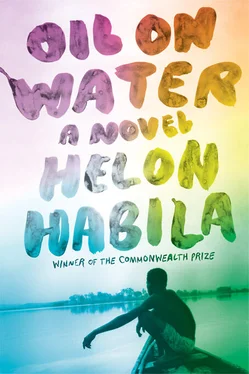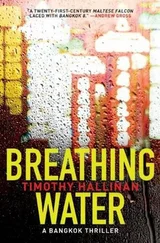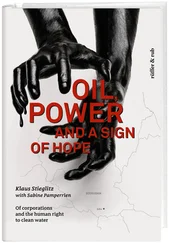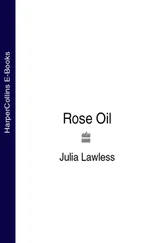— Well, I did my duty as their doctor. I told them of the dangers that accompany that quenchless flare, but they wouldn’t listen. And then a year later, when the livestock began to die and the plants began to wither on their stalks, I took samples of the drinking water and in my lab I measured the level of toxins in it: it was rising, steadily. In one year it had grown to almost twice the safe level. Of course, the people didn’t listen, they were still in thrall to the orange glare. When I confronted the oil workers, they offered me money and a job. The manager, an Italian guy, wrote me a check and said I was now on their payroll. He told me to continue doing what I was doing, but this time I was to come only to him with my results. I thought they’d do something with my results, but they didn’t. So, when people started dying, I took blood samples and recorded the toxins in them, and this time I sent my results to the government. They thanked me and dumped the results in some filing cabinet. More people died and I sent my results to NGOs and international organizations, which published them in international journals and urged the government to do something about the flares, but nothing happened. More people fell sick, a lot died. I watched the night market fold up and the council meetings cease. The church also folded when Brother Jonah got a job as a clerk with the oil company. Almost overnight I watched the whole village disappear, just like that. I was their doctor, I should have done more than I did. Well, since then I’ve become something of an itinerant doctor. I go from community to community and I try to create awareness of the dangers lurking in the wells and in the air above. They all share the same story, the same diseases. I do what good I can.
I watched his lips as he spoke, watched his cigarette burn and the ash rise in loops high over his head, adding more pollutants to the polluted air, but all the time my mind was trying to make sense of what he had said about Zaq.
He put a hand on my shoulder. — I’m sorry about your friend. I’ll talk to the Major. I’ll try to persuade him to let you go, but I warn you, don’t expect a quick response. Take your friend to another doctor. Get a second opinion, but that won’t really help much, I’m afraid. I’ve seen this happen many times in this area. A man suddenly comes down with a mild headache, becomes feverish, then develops rashes, and suddenly a vital organ shuts down. And those whom the disease doesn’t kill, the violence does. Sometimes I wonder what I’m doing here; I tell you there’s more need for gravediggers than for a doctor.
I wanted to ask the Doctor if he thought the fighting would end soon, who was right, who was wrong, if he knew where the Professor was, if he had heard about the kidnapped woman, but instead I turned and looked toward the shed where Zaq lay, breathing away his life.
— Thank you, Doctor. I have to go to my friend now.
— By all means. Let’s go together.
He led the way, belching smoke, his fat arms horizontally suspended from his sides, his fat bottom almost popping out of his trousers, and I could hear his wheezing, phlegmy breathing, and I wanted to shout after him, Doctor, heal thyself!
— The Major will speak with you.I told him about your need to be gone from here as soon as possible. He’s waiting for us in the command hut. Let’s not keep him waiting.
The Doctor led the way, and Zaq and I followed. Soldiers bearing rifles came and went, some nodding briefly to the Doctor as they passed us. The command hut was situated at the edge of the camp, right by the path we took coming in from the boat. The Major met us in front of the hut, waved us in, a smile on his face.
— Hope you had a good night, hope the mosquitoes didn’t bother you.
He was in a good mood today, almost conciliatory, making a joke about the rock-hard bread he gave us and the black sugarless tea in dented aluminum cups. Zaq and I sat on a long hardwood bench that faced the command table, with the Major on the other side of it. The Doctor sat apart, by a square window looking out on the trees by the waterfront. I ate the hard dry bread and sipped the cold tea, but Zaq didn’t even look at the bread, and the tea he downed in a single gulp, more from thirst than from an enjoyment of the bitter, inky taste. He didn’t look like a dying man — he looked rested and alert. The Doctor said it would be like this, good days alternating with bad ones. I hadn’t told Zaq all that the Doctor had said, only that his condition was serious, and he needed to be in a hospital as soon as possible. He had nodded and failed to inquire any further.
I decided to take advantage of the Major’s good mood immediately.
— The old man and the boy. . when can we talk to them?
— Tell me, what do you know about them?
— They’re simple peasants, trying to make a living. We’ve been together this past week, believe me, they’re not rebels.
— I know these people more than you do. You know the problem with you reporters? You believe everything you read in the papers.
The Doctor laughed, the Major waited for us to laugh, and when we didn’t he went on.
— Let me give you an example. The Doctor here told me that one of your plans on this trip is to interview the Professor, yes? Well, what do you know about him? I’ll tell you what you know: he used to work for an oil company, and one day he grew disgusted with the environmental abuse and he became a militant to fight for change. That’s what the papers say. Well, that isn’t true.
Zaq lifted his empty teacup and put it down again.
— Well, Major, what is true?
— The Doctor can tell you about the deserted villages around here. They used to be well populated, you know, thriving. Now the people have all packed their things and left, because of the violence. People like the Professor are responsible for that, they call themselves freedom fighters, but they are rebels, terrorists, kidnappers. Do you keep up with the news? Ah, yes, you write the news. Well, just now, on that radio, it was announced they just kidnapped a three-year-old girl in Port Harcourt, and you know what, her family is not connected to the oil industry. A three-year-old girl. They don’t care if they’re caught or shot. Their life is so miserable to begin with, and they dream of becoming instant millionaires. It’s my job to pursue them to their swamp hideouts. I capture them, and most times it’s easier to shoot them than to capture them. Saves time, saves the government money.
— Now, let’s come back to this so-called Professor. We have a big file on him, on all of them. His name is Ani Wilson. A secondary-school dropout, a backstreet thug and bully who went to jail for the first time at fifteen. When he came out at twenty he became a party thug in the pay of his local government chairman, who was up for reelection. He was convicted of murder at the age of twenty-two and sent to prison for life. He broke out of jail at thirty, by which time he had realized there was no future in being a petty thug and hired gun. Luckily for him, his politician godfather had reinvented himself as a pro-environmentalist and won a seat in the senate. But they parted ways when Ani was bought by a rival politician, who paid him to kill his erstwhile godfather; the assassination attempt was foiled, and his godfather called the police on him, and that was when he moved into the swamps and joined a rebel group that specialized in kidnapping foreigners for ransom. You know who the leader of that group was?
— Who?
— He was known as the Professor — only he wasn’t a real professor. It was just his gang name.
— And so—
— And so Ani killed him in a power struggle and took over not only the leadership but the title of “Professor” as well. The myth of the Professor lives on.
Читать дальше












